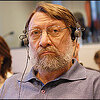Paul Hollander (1) (1932–2019)
Autore di Political Pilgrims: Western Intellectuals in Search of the Good Society
Per altri autori con il nome Paul Hollander, vedi la pagina di disambiguazione.
Sull'Autore
Paul Hollander is professor emeritus of sociology at the University of Massachusetts, Amherst
Opere di Paul Hollander
From the Gulag to the Killing Fields: Personal Accounts of Political Violence and Repression in Communist States (2006) — A cura di — 38 copie
The End of Commitment: Intellectuals, Revolutionaries, and Political Morality in the Twentieth Century (2006) 27 copie
From Benito Mussolini to Hugo Chavez: Intellectuals and a Century of Political Hero Worship (2016) 13 copie
Opere correlate
Etichette
Informazioni generali
- Data di nascita
- 1932-10-03
- Data di morte
- 2019-04-09
- Sesso
- male
- Nazionalità
- USA
Hungary (birth) - Luogo di nascita
- Hungary
- Istruzione
- London School of Economics (BA)
Princeton University (PhD ∙ Sociology) - Attività lavorative
- political sociologist
- Organizzazioni
- University of Massachusetts Amherst
Utenti
Recensioni
Liste
Potrebbero anche piacerti
Autori correlati
Statistiche
- Opere
- 19
- Opere correlate
- 2
- Utenti
- 302
- Popolarità
- #77,842
- Voto
- 3.5
- Recensioni
- 5
- ISBN
- 44
- Lingue
- 1















Many intellectuals visiting socialist states missed or ignored things we now know about, such as show trials and famines. Part of this was because they didn’t want to give up their dream of socialist utopia; another factor is what Hollander calls the techniques of hospitality. These people were welcomed and guided – made to feel important by having access to leaders and academics. They were given good food and accommodation, and most importantly saw only what the government wanted them to.
Hollander had his sights firmly fixed on characters like Italian communist Maria Marocchi. Hollander includes a quote from her singing the praises of the Chinese for being well-washed with soap and water and completely without makeup; but she seems to miss the dire effects of the Cultural Revolution. Others like Han Suyin, Bernard Shaw, Andre Gide and Jean Paul Satre also come in for criticism for their vanity, blindness and faulty analytical powers.
These luminaries allowed themselves to be duped by Potemkin villages: show villages (or hospitals or prisons) that gave a positive impression of the USSR or China. In the late 18th century, the Russian Empress Catherine the Great went on a tour of the Crimea – the “New Russia” taken off the Ottomans – to see her new subjects. Her advisor, Potemkin, arranged for his men to travel ahead of Catherine, erecting temporary villages to impress her. The technique has since been used many times, with variations: with model work camp in the Soviet Union, and in China with show fields bursting with rice during the Great Leap Forward. One might argue the entire city of modern Pyongyang is a Potemkin village.
It’s all valid stuff but he doesn’t look at the Western intellectuals who became enamoured of fascism, this would have added a nice balance to the book. To fill out the picture "Travellers in the Third Reich" by Julia Boyd would be a good one to read.… (altro)